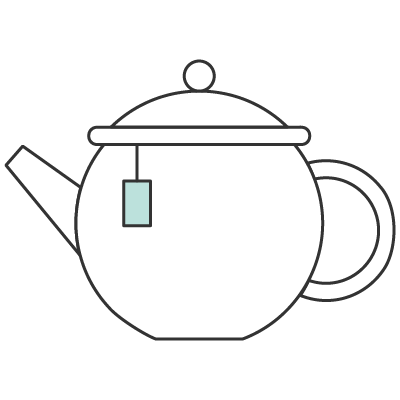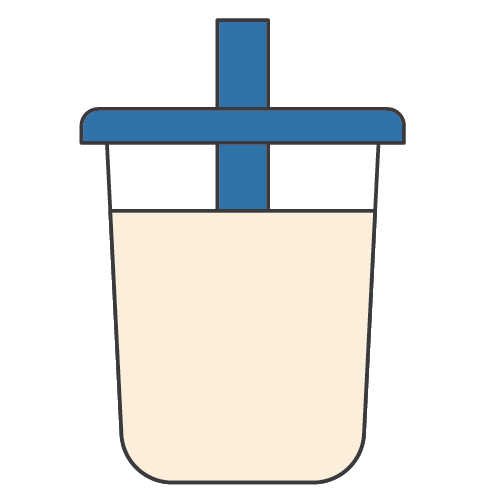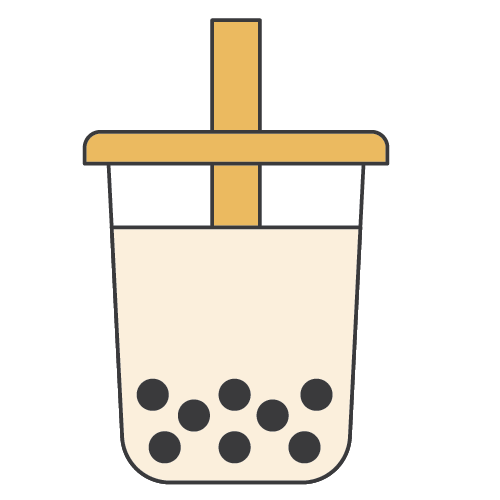As the weather is still cold outside, now is the perfect season for hot drinks! So this week, let’s talk about tea. Discover 7 popular types of Chinese tea — to find a new favourite and bring a nice souvenir back home 🍵
“Tea” in Chinese
Let’s begin by looking at “tea” itself:

chá
tea
Most Popular Chinese Tea
To start, let’s look at 2 most popular types of tea: black and green!
01. Black Tea

红茶
hóngchá
black tea
Black tea is the most oxidized type of tea. Notice how it is literally called “red tea” in Chinese – because of the reddish color of the brew.
贵州遵义 (Guìzhōu Zūnyì, black tea from Guizhou province)
祁门红茶 (Qímén hóngchá, black tea from Anhui province)
正山小种 (Zhèngshān Xiǎozhǒng, black tea from Fujian province)
02. Green Tea

lǜchá
green tea
Green tea is made from the same tea leaves and buds as black and oolong teas, but is roasted quickly to avoid oxidation. For green tea, the color character is 绿 (lǜ) – the color that represents nature, and is used to describe the color of plants and trees as well as “green” or “eco” life.
碧螺春 (Bìluóchūn, green tea from Jiangsu province, near Lake Tai)
西湖龙井 (Xīhú Lóngjǐng, green tea from Zhejiang province, near Lake Xihu)
庐山云雾 (Lúshān Yúnwù, green tea from Jiangxi province)
Other Types of Chinese Tea
Other popular types of tea include:
03. Oolong Tea

wūlóngchá
oolong tea
Oolong is a semi-oxidized type of Chinese tea. It is traditionally produced in Fujian province, namely in two regions: the Wuyi Mountains and Anxi County.
铁观音 (Tiě Guānyīn, ‘Iron Goddess of Mercy’, oolong tea from Anxi County)
大红袍 (Dàhóngpáo, ‘Big Red Robe’, oolong tea from the Wuyi Mountains)
武夷岩茶 (Wǔyí Yánchá, oolong tea from the Wuyi Mountains)
04. Pu’er Tea

pǔ’ěrchá
pu’er tea
Unlike the teas mentioned earlier, pu’er is a variety of fermented tea. Its name comes from the ancient tea-trading town of Pu’er (普洱 Pǔ’ěr). It is traditionally produced in Yunnan Province.
Mind that there are 2 types of pu’er – the traditional, long-aged type called “raw tea” (生茶 shēng chá), and the modern type produced via accelerated fermentation called “ripe tea” (熟茶 shóu chá).
大益普洱茶 (Dàyì Pǔ’ěrchá, brand of pu’er tea from Yunnan province)
下关沱茶 (Xiàguān Tuóchá, brand of pressed pu’er tea from Yunnan province)
澜沧古茶 (Láncāng Gǔchá, brand of pu’er tea from Yunnan province)
05. White Tea

báichá
white tea
White tea is made from the buds and immature tea leaves picked shortly before the buds have fully opened. It’s also not oxidized, so its flavor is very ‘light’ compared to other types of tea.
白牡丹 (Bái Mǔdān, ‘White Peony’, white tea from Fujian province)
白毫银针 (Báiháo Yínzhēn, ‘Silver Needle’, white tea from Fujian province)
6. Yellow Tea

huángchá
yellow tea
Yellow tea is similar to green tea, as both are lightly oxidized. However, there is one more step added to the process which makes yellow tea more rare and expensive, called “sealed yellowing”. This step involves light fermentation, and thanks to it the tea gets its yellow color and a mellow taste.
霍山黄芽 (Huòshān Huángyá, yellow tea from Anhui province)
君山银针 (Jūnshān Yínzhēn, yellow tea from Hunan province)
蒙顶黄芽 (Mēngdǐng Huángyá, yellow tea from Sichuan province)
Modern Tea in China
The traditional tea culture with tea houses (茶馆, cháguǎn) and the tea ceremony (茶艺, cháyì) is still present in modern China. However, if you mention getting “some tea” with your Chinese friends or colleagues, they will probably think about milk tea or bubble tea!
07. Milk / Bubble Tea

nǎichá
milk tea

zhēnzhū nǎichá
bubble tea / boba
There are so many brands and flavors of milk tea these days, that it would be difficult to pick just a few to recommend. You can start by choosing your favourite tea base (black, green, oolong, barley, herbal, etc), then choose milk (regular, soy, ‘thick’, etc), and finally pick some extra ingredients (tapioca balls, taro powder, coconut jelly, oats, and so on).
鸳鸯奶茶 (Yuānyāng nǎichá, Yuanyang tea – Hong Kong-style drink, sweet black tea + milk + brewed coffee);
蒙古奶茶 (Měnggǔ nǎichá, Suutei tsai – Mongolian milk tea made with toasted millet and green tea)
Your Turn
Now that we’ve shared so many types and names of Chinese tea, it’s your turn!
What did we miss?
And what’s your favourite Chinese tea?
Share in comments 🍵









0 Comments